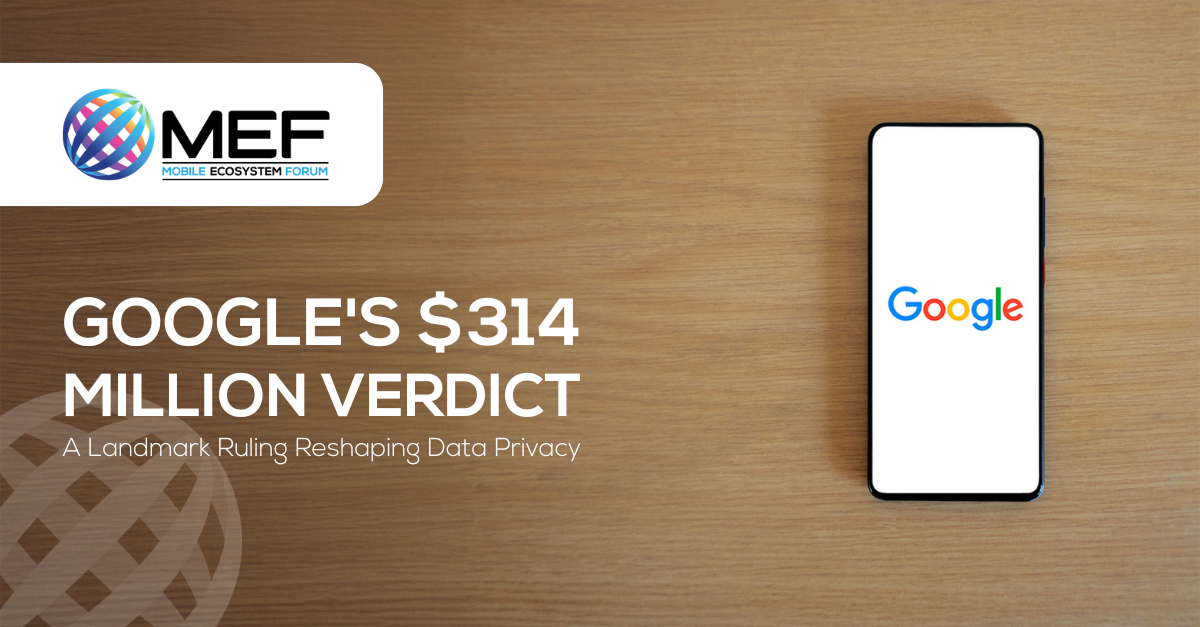A US jury’s decision against Google for unauthorized cellular data collection sets a powerful precedent, challenging anonymization claims and demanding stricter consent standards across the mobile ecosystem and beyond.
Discover the profound implications of a landmark legal decision in “The Google Verdict Explained,” a timely report from the Mobile Ecosystem Forum (MEF). This essential document delves into the U.S. jury’s order for Google to pay $314 million in a class-action lawsuit on July 1, 2025. The verdict, stemming from allegations that Google collected cellular data, including precise location and app usage, from Android users without explicit consent, even when privacy settings were engaged, sets a powerful legal precedent.
“The Google Verdict Explained” clarifies the critical shifts in legal interpretations of data privacy highlighted by this ruling. It challenges the long-standing industry practice of relying on anonymization as a sufficient safeguard against privacy violations, emphasizing concerns about re-identification and the lack of clear initial consent. Furthermore, the report details how Google’s consent mechanisms were deemed insufficient, underscoring a growing trend towards stricter requirements for explicit, informed, and granular consent that users can easily manage.
This verdict has wide-ranging implications for the entire mobile ecosystem, fundamentally reshaping data practices, privacy expectations, and commercial models. The report outlines the imperative for explicit, granular, and easily revocable consent, robust de-identification techniques, increased scrutiny on data sharing, and a strong emphasis on data minimization—collecting only strictly necessary information. Beyond smartphones, these principles will likely extend to the broader landscape of connected devices and the Internet of Things, including smart cities, automotive, smart homes, and wearables.

The report also explores potential shifts in commercial models, moving towards contextual advertising and privacy-preserving technologies, where privacy becomes a core value and a differentiator for attracting and retaining users. Expect an increase in regulatory actions and class-action lawsuits, accelerating the adoption of Privacy-by-Design principles. For MEF members, this means a necessity to audit data practices, strengthen consent mechanisms, and embrace privacy as an innovation driver.
To understand the full scope of this transformative verdict and its impact on data privacy, commercial strategies, and regulatory landscapes within the mobile ecosystem, download “The Google Verdict Explained” today. This report is indispensable for mobile operators, app developers, device manufacturers, and anyone invested in the future of trusted services in the digital economy.
Key Takeaways
- On July 1, 2025, a US jury ordered Google to pay $314 million in a class-action lawsuit for allegedly collecting cellular data, including precise location and app usage details, from Android users without explicit consent.
- The verdict challenges the effectiveness of “anonymization” claims as a sufficient legal safeguard against privacy violations and demands stricter, more granular, and easily understandable consent mechanisms from users.
- This ruling sets a strong legal precedent for future data privacy litigation, particularly concerning cellular data and anonymization, and is likely to embolden other plaintiffs and provide regulators with a stronger basis for enforcement.
- The implications extend beyond smartphones to the broader landscape of connected devices and the Internet of Things (IoT), signaling a need for explicit consent, data minimization, and robust de-identification in emerging sectors like smart cities, automotive, smart homes, and wearables.
- Companies heavily reliant on vast data collection for targeted advertising will face higher compliance costs, potentially leading to a pivot towards contextual advertising or privacy-preserving ad technologies, and a shift where privacy becomes a core value and market differentiator.

